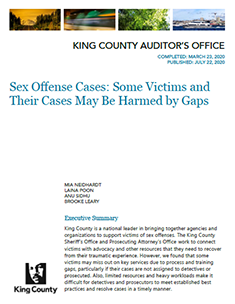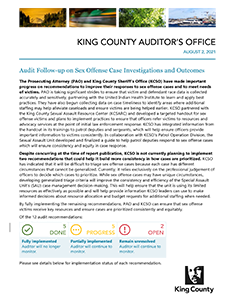Sex Offense Cases: Some Victims and Their Cases May Be Harmed by Gaps
July 22, 2020
NEW! Download the latest follow-up report
King County is a national leader in bringing together agencies and organizations to support victims of sex offenses. The King County Sheriff’s Office and Prosecuting Attorney’s Office work to connect victims with advocacy and other resources that they need to recover from their traumatic experience. However, we found that some victims may miss out on key services due to process and training gaps, particularly if their cases are not assigned to detectives or prosecuted. Also, limited resources and heavy workloads make it difficult for detectives and prosecutors to meet established best practices and resolve cases in a timely manner.
Watch the presentation (15:22)
Status
Of the 12 recommendations:
| DONE | 7 | Recommendations have been fully implemented. Auditor will no longer monitor. |
|---|---|---|
| PROGRESS | 4 | Recommendations are in progress or partially implemented. Auditor will continue to monitor. |
| OPEN | 1 | Recommendations remain unresolved. Auditor will continue to monitor. |
| CLOSED | 0 | Recommendation is no longer applicable. Auditor will no longer monitor. |
Summary
In 2018, the U.S. Department of Justice estimated that a sex assault occurs every 43 seconds in the United States. Impacts of sex offenses can be devastating. The U.S. Department of Justice also reports that 75 percent of victims experience moderate to severe distress, or problems with relationships, work, or school problems following an assault. Victim services are a vital part of sex offense response. Advocates, in particular, help support victims through the criminal justice process and connect them with additional services that can help them recover, such as counseling. Reports of sex offenses in King County increased by 27 percent between 2015 and mid-2018.
We found gaps at the patrol, investigation, and prosecution levels in processes intended to connect victims with advocates and meet standards for timely work. King County Sheriff’s Office (Sheriff’s Office) patrol deputies do not always provide victims with information on advocacy, as required under state law. This is especially problematic for the 25 percent of cases where the initial law enforcement response is the victim’s only contact with the criminal justice system. Existing informational materials for victims are not user-friendly and the infrequency of sex offense calls and inconsistent training mean that patrol deputies may not always follow correct procedures when responding to calls. The Prosecuting Attorney’s Office only connects victims with advocacy information after it has filed a case, meaning that victims whose cases are not filed may miss out on this information and those who it does connect get the information late in the process.
Heavy workloads and staff turnover at the Sheriff’s Office Special Assault Unit (SAU) and the Prosecuting Attorney’s Office make it difficult to meet standards for best practices. In cases we reviewed, one-third of SAU investigations did not conduct the victim interview within the recommended timeframe.1 The Prosecuting Attorney’s Office also doesn’t fully meet timeline standards, although it does meet them for two-thirds of cases. Meeting these standards is sometimes outside the control of the agencies and limited resources are a factor.
1Of cases assigned to detectives that had a victim interview.
We recommend the Sheriff’s Office develop and give information to all victims of sex offenses and institute a training and guidance strategy to ensure deputies effectively respond to sex offense calls. The Sheriff’s Office and Prosecuting Attorney’s Office should assess resources allocated to investigation and prosecution in order to better meet service and timeliness goals.
Reports related to this audit
Currently, there are no related reports to this project.
Audit team
Mia Neidhardt, Laina Poon, Anu Sidhu, and Brooke Leary worked on this audit. If you have any questions or would like more information, please call the King County Auditor's Office at 206-477-1033 or contact us by email at KCAO@kingcounty.gov.

 Translate
Translate

